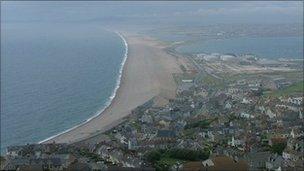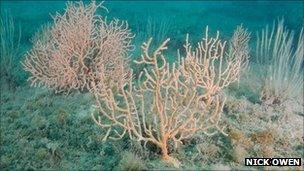Studland dropped from Marine Conservation Zone list
- Published

Chesil Beach is one of three sites in Dorset that remain on the list
Dorset Wildlife Trust says it is disappointed that Studland was dropped from the government's list of potential Marine Conservation Zones (MCZ).
Of the six areas initially included only three remain - Poole Rocks in Poole Bay, Chesil beach with Stennis Ledges, and south of Weymouth Bay.
Kimmeridge Bay and an area south of Portland were also taken off the list.
Of an initial 127 sites proposed by experts last year, Defra proposes to designate just 31.
The trust said it was "disappointed by the lack of ambition shown in this consultation".
It added in a statement: "The 127 recommended Marine Conservation Zones were chosen after two years of hard work by more than one million stakeholders from all sectors of the marine environment and at a cost of over £8.8m to government."
Defra said the proposal included sites it deemed suitable for designation in 2013, but it anticipated that additional MCZs would be designated in the future.
Will be responding
Peter Tinsley, Living Seas manager at Dorset Wildlife Trust, said: "In Dorset, we are especially surprised and dismayed that Studland is not included.
"The evidence and the ecological value of this site are overwhelming and we will be arguing strongly for its inclusion.

Pink seafans, a protected species of soft coral, are at risk along Chesil Beach from trawler equipment
"We accept that the site at Kimmeridge is too small to be viable and will argue that it should be increased.
"And we will push for the inclusion of the south of Portland site, which includes the extraordinary underwater cliffs of Portland Deep."
The Wildlife Trusts across England will be responding to the government consultation at the end of January.
Mr Tinsley added: "We are disappointed that the promised coherent network of marine protected areas is not going to be delivered by designating such a small number of sites nationally.
"The network was designed to ensure that we don't end up with isolated and vulnerable sites and to ensure that the wide range of marine habitats found in UK seas are protected."
The trust welcomed the inclusion of Chesil's reef ledges - known as Stennis Ledge.
They extend north east to south west along the 29km (18 mile) stretch of Chesil's shingle beach and provide a rich, bio-diverse habitat for wildlife such as native oysters, sponges and pink seafans.
Pink seafans is a protected species of soft coral that are at risk in the area from trawler equipment.
- Published8 September 2011
- Published8 September 2011
- Published8 September 2011
- Published7 September 2011
- Published1 September 2011
- Published4 August 2011
- Published24 May 2011